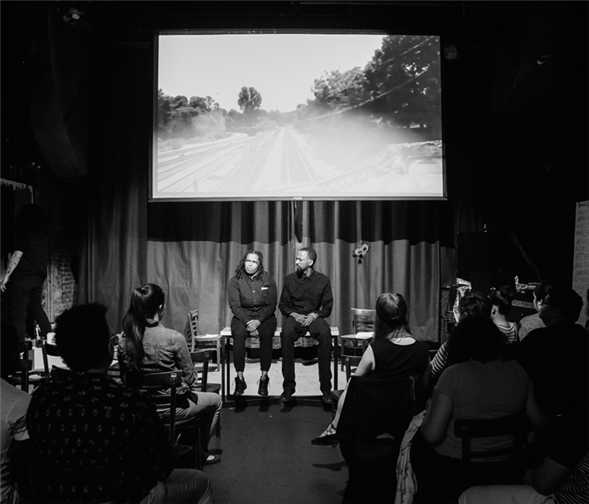With food and conversation, a new play invites us to explore our country's racism---
When we see the president deliver a eulogy in Charleston, or when we walk home through a New York City protest on behalf of Eric Garner, it's impossible to forget that racism and brutality still shape this country. But these flashpoint events are just a small piece of the cultural problem. How do we confront the micro-aggressions that people face every day? How can we acknowledge what actor/writer Modesto "Flako" Jimenez calls "the constant disrespect we give each other without saying it"?
Art can be an essential tool. That's why Jimenez and poet Saroya Marsh have created
How to Make It in Black America Pt 1. Running through July 12 at
JACK, the piece tackles issues of race from the present day and throughout history with a combination of poetry, music, and a visual art landscape that is painted new each night."
The latter group has served as a model for his current show. With events like Oye! Avant Garde Night and Ghetto Hors D'Oeuvres, the Brooklyn Gypsies fuse the sectors of Jimenez's life, inviting Bushwick natives, gentrifying newcomers, and artists of all stripes to collaborate. "These evenings are chances for me to have fun with
all my friends – from the gentrifiers that are broke to the artists that don’t know about tech," he says. Performances always conclude with a banquet of food and a chance for people to talk, which points to the deeper reason they happen in the first place. "I want to bring these worlds together and let them dance with each other. I want to mix the old community with the new."
Similarly,
How to Make it in Black America Pt 1 creates a chance for audience members to ask hard questions and talk with each other. During the first part of the show, music and video projections play. Audiences encounter prompts on their seats like "What do you want to talk about?", "What is the one drop rule?", and "Why do Puerto Ricans and Dominicans have issues?" Patrons also get to write their own questions and comments on slips of paper, which are put in a fishbowl. Jimenez and Marsh pull the papers out of the bowl, and they respond with improvised poetry and direct conversations with the crowd. "If the audience wants to talk, great," Jimenez says. "But no pressure."
Throughout the evening, Bonafide Rojas provides what Jimenez calls "visual swagger" and paints in response to the conversation around him. Toward the end of the performance, Jimenez has a conversation with a historic recording of James Baldwin and food is served.
"Sometimes during a play I don’t want to just go onto the next scene or talk about it with my friend that I came to the show with at a bar afterwards," Jimenez says. "Everybody eats. Brooklyn Gypsies spends money on food so that we can talk to each other at the end. There’s salad, rice and beans, chicken, pork, and cookies. Even the vegans get something! The projections keep going and the prompts are laying all around, so that there’s no choice but to talk about it."
---
Eliza Bent is a writer and performer based in Brooklyn
Pictured above: Marsh and Jimenez. Photo by Gustavo Mirabile.
